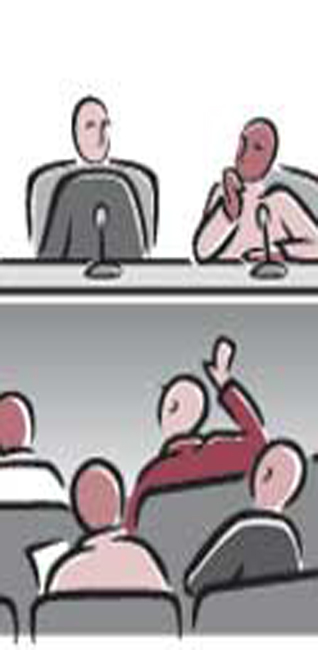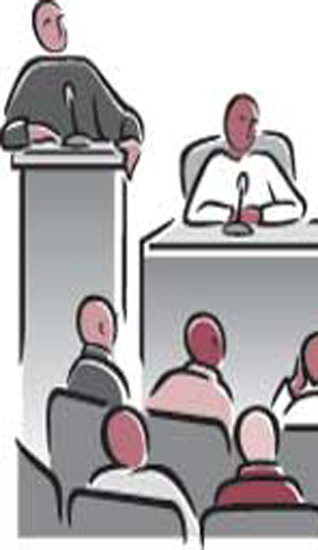Columnists
Postcards From The Edge:
Part II
T. SHER SINGH
DAILY FIX
Saturday, June 9, 2012
The year was 1989.
Seething with tensions between the Black community and Toronto’s Police Force, the city was close to a boil.
A number of young blacks had been shot in recent weeks and months by the police in dubious circumstances. It appeared that the police were quick on the draw, especially when it came to Blacks.
The Black community was not willing to stand by quietly anymore, in view of the inaction by both the Police and its overseers. Some head-strong members of the Black community made veiled but very public threats of possible retaliation. The Police responded, through their own veiled threats, to respond in kind, or worse.
A race war seemed to be in the offing, though still hidden under the veneer of a city poised to become a world-class city.
The Premier of the Province of Ontario, of which Toronto is capital, struck a Task Force to hold hearings around the province to understand the situation, and then to create a blue-print of police reform, because it had been pointed out that policies around policing had not changed for much of the century, that there was little, if any, public accountability on the part of the police, and a virtually non-existent complaint process.
Though still amongst the best police forces in the world, the police forces of Toronto, Ontario and Canada were in urgent need of overhauling to prevent a New-York-type of rot (a la Serpico, for example) setting into the Canadian counterparts.
Though my day job was as a litigation attorney, I had somehow got involved in policing issues and was increasingly being quoted in the media.
The Premier appointed me as one of the six members on the Task Force.
Even before we got started, the Black community pronounced it a ’white-wash’ and refused to participate.
So, one of the first tasks before us was to win their confidence. I was recruited to meet with a number of community leaders, and I did, privately, and assured them that, at the very least, I would make no compromises during the course of the entire process. “Hold me personally responsible if I do not do my job!” was my selling point. They accepted my assurances.
The hearings began, and as we toured the province, hearing directly from the various communities and the Police. The submissions made to us, and our examinations and, at times, our cross-examinations, were highly-charged and made “front-page” headlines across the land, week after week, month after month.
Partly because I was not tied to any vested interests, and partly because of my training as an advocate, my pointed questioning attracted considerable attention.
Before long, I became the focal point at the hearings: to the community groups, because they saw me as one willing to ask difficult questions; to the police forces (we were scrutinizing the 121 forces in the province!) because they were getting alarmed at the new level of public accountability, something they had not seen until now.
At one point, after I had grilled the Toronto Police Chief, the opening, lead story on national television and radio news that night, and the top headline on the front-pages the next morning was: “Commissioner Singh says - If your police force was a corporation, and this hearing a shareholders’ meeting, you’d all be summarily fired!“
It did not go well with the police. [The Police Chief resigned and went into permanent retirement not long thereafter.]
There was news of a bomb-threat at one of the hearing venues in Toronto.
I was privately asked to be “careful” - it was public knowledge that I was a single-parent and I lived alone with my 10-year-old daughter. I made arrangements for her to temporarily stay elsewhere; and I began to spend my nights sporadically in hotels or at friends’ homes.
There were attempts to “sway” me - there were private but unequivocal overtures from some police quarters, promising me a “high” appointment once the hearings were over. I scoffed at the suggestion, but kept a lid on it and mentioned it only to a key few in order to put it on the record.
Things were heating up at an alarming pace. The very public ire of the police unions was now being transferred from the Black community to the members and work of the Task Force … and me personally.
* * * * *
It began to dawn on me that my daily public exposure may expose my loved ones to possible harm.
I also began to question myself and entertain serious self-doubts.
Was I right in the direction I was taking? Was I being fair? Was self-interest guiding or shaping my involvement? [I had begun to hear whispered queries as to whether I had political ambitions. I publicly made a promise that I would NEVER run for political office, EVER! I have kept that promise to this day.]
Did I know what I was talking about, or was I totally off track?
Should I be doing this at all, or should I simply go back to my day-job fighting battles in law courts?
More importantly, was I being fair to my loved ones? What did they think when they saw my face splattered on the front-page, or my taking on the police so stridently?
Was I insane? Had I lost my mind?
* * * * *
I visited my parents one evening and raised the issue.
Yes, they’d been following my travels around the province with the Task Force, and the daily reportage.
I told them frankly about the bomb scare and the death threats and the general displeasure I had been arousing within police circles.
“You know, don’t you, that this means I am exposing you as well?”
They were quiet.
“Should I tone things down? Do you think I am wrong? Or going too far? What do you think?”
My father simply said: “Don’t worry about us. Do what you think needs to be said or done … that’s all that matters. Remember, this is not India. This is Canada. You do your job, and you’ll be fine. As for us, there’s absolutely nothing to worry about.”
As I was leaving, my father suggested I go talk to my Taya ji, his elder brother, who lived in another part of the town.
“He’s a wise man. Talk to him, and he’ll guide you.”
* * * * *
So I did.
I made a bee-line to my uncle’s place. I knew he’d be home. He had been bed-ridden for a while because of a string of ailments, though alert and in high spirits, as always.
He knew a bit about what I was up to, though not as well-versed as my parents. So I filled him in. He listened patiently, asking me a question here and there.
When I finished, he motioned that he wanted to sit up. I helped him as he struggled to an upright position. He sat on the bed, but now with his legs dangling down. I was on a chair beside his bed.
He didn’t say a word as he adjusted his network of tubes, IV and whatever. Took a couple of pills and a sip of water.
Examined his hands for a while. I began to worry if it was right for me to impose on him, considering his state.
He spoke up.
“How do you feel about what you’re doing?”
The question came as a surprise. I thought about it for a bit.
“I believe in what I’m doing. I’m not sure if I have any answers or the right answers. But I have a lot of questions, questions that no one else is asking … either they don’t want to, or they haven’t thought of them. And I feel I’m contributing, I’m doing my job, by bringing them forward.”
He nodded.
“Good,” he said. “Then, that’s all that matters. That you feel deep in your heart that you’re doing your best. The rest … let the chips fall where they may.”
He was silent for a minute or so, and then continued.
“They’ve selected you for the job because they see certain skills you have, skills that are needed on this job. They must feel you’re adding to the process.
“But don’t think that they have hired you for this because they think you’re perfect, or that they expect you to be perfect. You’ll make mistakes, and that’s fine too. But all you need to do is be honest, be fair, be diligent, be balanced. Do your homework. Nothing else matters.’
He waited a while, fiddling around with the tubes and pillows beside him, and then tucked one of his legs under him.
“But, most importantly, I want you to remember: people don’t go after anybody if he’s not doing anything meaningful, something useful, something that makes a difference.
“You tell me that your detractors are unhappy with you, and are making noises about silencing you. Well, all that means is that what you’re saying and doing has merit to it, that it threatens them because it might change things for the better. They are afraid of that change, and will fight it. Probably hard.
“But, you don’t need to be afraid. Why should you be? You’re being honest. They aren’t. So, it’s their worry.
“Sure, there’s a bit of risk. You will trip a few times. You’ll stumble somewhere, sometime, for sure. A couple of times, they may even be successful in knocking you down ... but never for long [kaddi kaddi tennu oh dhaah vi deven-gai, par thori der layi siraf.] Who knows? But why worry about something which may happen in the future. All it does is distract you. And you don’t want to let anyone do that to you… you want to carry on what your heart and mind and soul say you should be doing.
“Remember, if you were doing something which was meaningless or useless or had no real impact, they wouldn’t waste a second on you. The fact that they are all flustered over what you’re doing means only one thing, that someone important, some important people somewhere, know in their hearts that what you’re doing is right and it will produce results ... results they don’t want.
“And what does that tell you? That you need to simply carry on!”
“But, but,“ I interrupted him, “I’m worried about those at home, those who are affected by these very public goings on. Do I ignore the risks? Is that right on my part?”
“Stop worrying about what they who are afraid of you, might do. You have nothing to fear. If you are fearless in doing what you think is right, then it is they who will be afraid ... of you. If you’re strong, they can’t stop you. With Waheguru's blessings, you will keep marching on.”
He smiled at me and leaned over and put his hand on my shoulder.
‘Stop worrying. Go back and do your job as you see fit. The rest will take care of it self.”
POSTCARD # 3 - On Tuesday, June 12, 2012 ...
Conversation about this article
1: Sangat Singh (Kuala Lumpur, Malaysia), June 09, 2012, 9:39 AM.
Sher ji, if your monumental task were to be summarized, I would have to seek the help of Pindar, the Greek poet, who said: "Exhaust the limits of the possible." And everything is possible. And you did it.
2: Baldev Singh (Bradford, United Kingdom), June 09, 2012, 10:08 AM.
Having mentors is very important when there is anguish or an emergency in life ... Like T.Sher Singh's Uncle.
3: Rosalia (Baltimore, Maryland, U.S.A.), June 09, 2012, 11:59 AM.
Printing out your uncle's sage and universal advice and hanging it on my desk. Love these Daily Fixes!




